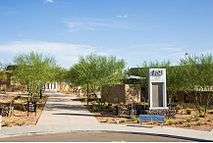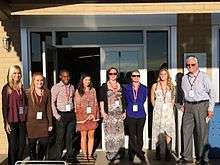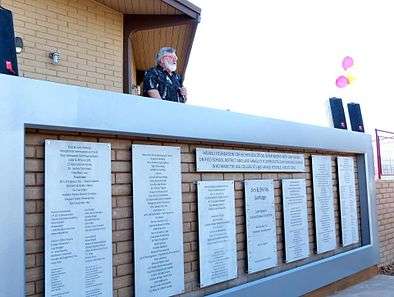ASU Colleges at Lake Havasu City
| Type | Public |
|---|---|
| Established | 2012 |
| President | Michael M. Crow |
| Location | Lake Havasu City, Arizona, United States |
| Campus | Suburban |
| Website | ASU Colleges at Lake Havasu City |
ASU Colleges at Lake Havasu City (ASU Havasu) is a small, low-cost extension of the Arizona State University system offering high-demand, undergraduate degrees. The campus opened in Lake Havasu City, Arizona in the Fall of 2012 and focuses on an experiential, student-centered approach to learning.[1] The education and experience a student receives at ASU Havasu is akin to that of a private liberal arts college, with the name and resources of a large, state school.
History

The "ASU Colleges" model was formulated in 2009 as an initiative to offer high quality, undergraduate degrees at lower costs. The Arizona Board of Regents, along with the presidents of each public Arizona university, were tasked with coming up with models of offering baccalaureate degrees to help prepare students for real world careers. In order for the idea to work, the city in which the college would be located would have to raise the funds for a physical location of the campus. Several locations throughout Arizona were highlighted, but the one city that pushed for the campus was Lake Havasu City, AZ. With support from generous Lake Havasu citizens, business owners, city officials, and non-profit organizations, $2 million was raised in an effort to renovate a previous middle school site for the ASU Havasu campus. The fundraising efforts were coordinated by the Havasu Foundation for Higher Education (HFHE), a 501(c)3 non-profit organization, that was started in 2004 by Dr. Bill Ullery. The HFHE was started as an initiative to highlight the importance of higher education in the Mohave County area. The HFHE continues to offer fundraising opportunities for campus projects and scholarships for new and current students.
Academics
Academic Programs
ASU Havasu offers an interdisciplinary approach to student education and curriculum. There are currently 18 bachelor's degrees and 3 exploratory programs that students can choose from. The bachelor's degrees are as follows: Applied Computing (B.S.), Biology (B.S.), Biology (Environmental Science)(B.S.), Business (Business Administration)(B.A.), Business (Communication)(B.A.), (Communication)(B.A. and B.S.), Environmental Science (B.A. and B.S.), General Studies (B.A.), Health Education and Health Promotion (B.S.), Kinesiology (B.S.), Organizational Leadership (B.A.), Political Science (B.A.), Psychology (B.A. and B.S.), and Sociology (B.A.). The exploratory programs are as follows: Exploratory Health and Life Sciences, Exploratory Humanities, Fine Arts and Design, and Exploratory Social and Behavioral Sciences.[2]
Tuition and Financial Aid

The base tuition and fees for the 2016-2017 academic year is $9,954 for non-residents and $6,536 for AZ residents. The lower tuition makes ASU Havasu a viable option for students in neighboring states who want to move out of state for college.
According to the website, "9 in 10 ASU at Lake Havasu students receive some form of financial aid."[3] Students at ASU Havasu can apply for the same scholarships as any other Arizona State University student. Freshmen students are also automatically evaluated for the New American University Scholarship These scholarships are pro-rated at a level that makes them comparable to the percentage of the award received by students attending the other Phoenix-area campuses with the higher tuition rates.
Additionally, students attending ASU Havasu can receive scholarships from private donors of the campus, but all awards are contingent on funding.
Faculty
Contrary to the models of some branch campuses, ASU Havasu currently has full-time, doctorate level faculty who physically teach students at ASU Havasu. There are currently 15 full-time instructors and 7 adjunct faculty members.[4]
Degrees Awarded
Since the opening of the campus is 2012, ASU Havasu has graduated 58 students.

My Havasu Plan and Senior Capstone Projects
Students at ASU Havasu follow a path of experiential learning during the quest for his or her baccalaurette degree. The My Havasu Plan is a strategy used to develop leadership skills, community involvement, and real world experience for each student.
Freshman Year
Freshmen students work with a local community group and a faculty advisor to create a "Freshman Experience Project." Past examples include:
Political Candidacy Program
"Working with the Lake Havasu Area Chamber of Commerce, a group surveyed past and present political candidates on their interest in funding a political candidacy program. Based on the survey results, they determined there is a need for political training in Havasu, as candidacy programs are not available. Through support from other local Chamber of Commerce chapters, the students were able to create a political candidacy program to serve the needs of the city."[5]
Cat Tail Cove Survey
"A duo of students work with Arizona State Parks by surveying and collecting data from winter visitors about their interests in having additional amenities at state parks that are no longer governmentally funded. This project helped identify other funding ventures to help develop better amenities in Arizona’s state parks."[5]
Sophomore Year
Sophomore students are encouraged to become involved and/or start a student club. There are currently 12 student clubs on campus, all of which have been organically started by students going through this plan. Student clubs include, but are not limited to the Outdoor Pursuits Program, Digital Media Organization, Environmental and Community Outreach, and a Lake Havasu Changemaker Central branch.
Students are also encouraged to take part in study abroad trips. The 2015-2016 academic year included trips to Cuba, Costa Rica, and Quebec.
Junior Year
In a student's junior year, they are encouraged to earn an internship in the Lake Havasu area. The school currently has partnerships with the Lake Havasu Unified School District, the Lake Havasu Area Chamber of Commerce, and the Lake Havasu City Convention and Visitor's Bureau. Future partnerships are being determined for upcoming semesters.
Senior Year
A student in his or her senior year will complete their Senior Capstone Project. This project is comparable to the work a graduate student completes in a master's program. Alongside a faculty advisor, the student will tackle an issue of his or her choice and conduct field analysis on the topic. They will then analyze the data, develop a research paper and presentation, and propose the findings in an open forum at the end of their last semester.
Facilities
Residence Hall
In March 2015, ASU purchased the motel that sat on the Northwest corner of the lot where ASU Havasu is situated. As phase 1 of the project, the 20 outer rooms were gutted and renovated. For the first time since opening in fall of 2012, ASU Havasu had on-campus housing for the fall of 2015.
Phase 2 of the residence hall project took place in the summer of 2016. 11 rooms in the middle building were renovated to accommodate for increasing enrollment in the fall of 2016. There are double, single, and ADA compliant rooms, each costing $5,700, $6,500, and $6,000, respectively.
Dedication Wall and Student Center Patio
A dedication wall sits in the center of campus. The wall commemorates the efforts of the Lake Havasu City community in raising $2 million to start the campus. Behind the wall rests the student center. The patio of the student center boasts one of the best views of Lake Havasu and the surrounding mountain ranges.


References
- ↑ "ASU Colleges at Lake Havasu Home". havasu.asu.edu. Retrieved 2016-06-14.
- ↑ "ASU Colleges at Lake Havasu Degrees". havasu.asu.edu/degrees. Retrieved 2016-06-14.
- ↑ "ASU Colleges at Lake Havasu Finance". havasu.asu.edu. Retrieved 2016-06-14.
- ↑ "ASU Colleges at Lake Havasu Faculty". havasu.asu.edu. Retrieved 2016-06-14.
- 1 2 "My Havasu Plan". havasu.asu.edu. Retrieved 2016-06-14.
External links
Coordinates: 34°28′23″N 114°19′16″W / 34.473°N 114.321°W